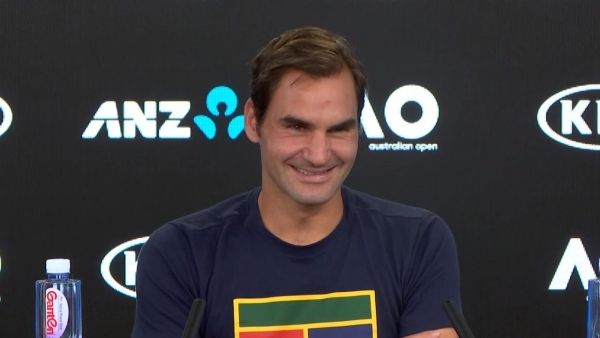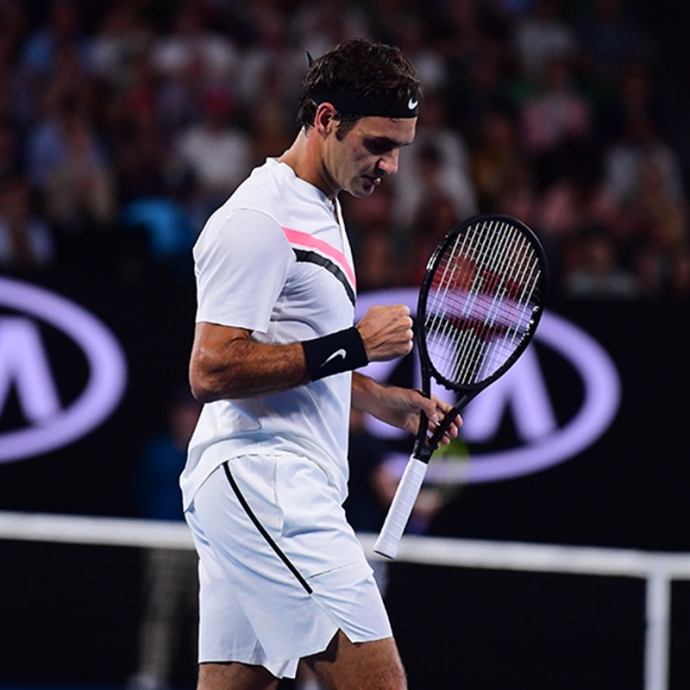Q. That was your 90th win here. Tell us some of your favorite memories from your wins here.
ROGER FEDERER: Probably my first round here in 2000 against Chang, I believe it was. That was cool. Clearly my first win here. The semifinal match against Ferrero, securing world No. 1 the following Monday, was big for me, a couple days after winning my first Australian Open against Safin.
I had a lot of five-setters on this court, too. Never really had a bad tournament, to be honest. Even in the year I lost to Seppi, I thought I was actually playing all right. Even the Safin match I ended up losing in '05 was epic.
Of course, all the matches -- the two finals with Rafa here in '09, which was the best we ever played against each other, I believe, then last year's.
2010 also, the first time I won, I think it was my first major with the girls. That was nice.
Q. How do you assess your game today against somebody you've beaten so many times now?
ROGER FEDERER: Yeah, I mean, I was hoping I could play at that level. No, I'm very happy that I was able to rise to a level that I needed to beat Richard.
It was tough. The score shows it, as well. I could have done it maybe a bit faster. At the same time I'm happy to have done it the way it happened. I was pleased. I think I had some good shots. Totally different conditions today. From 10% humidity, we went to 75%. That was interesting. I think we were both feeling it. All of a sudden you were sweating like mad. It was different.
I was happy the way I played. I also thought Richard, we both played a good level again, so it was fun.
Q. I heard you talking about your kids on court. A lot of players say they wouldn't want their kids to be professional tennis players. Sounded like you wouldn't mind. Would you be happy if they followed in your footsteps?
ROGER FEDERER: I mean, I hope they don't just because we don't need another 25 years on tour. No, I'm just a supportive parent. I can't tell which direction they're going to go. If there's going to be anything in sports or somewhere in finance or business, I have no idea where they're going to go.
All I know is I'll be incredibly supportive of them. I think it's great for them to do sports early on in their life. I think it's good for them. Winning, losing, that comes a little bit later, but you learn a lot from that. I did anyway.
I think also you make a lot of friends through sports. You get to know yourself a bit better. It's healthy. You move around. You go outside. I'm a big believer in these things. I'm happy they all do play tennis a little bit because basically literally all our friends who have kids as well, they all play tennis.
I wouldn't want my kids to be the only ones who don't play tennis, so with my wife we have sort of a little requirement on things they have to do in their life, and tennis is unfortunately one of them. It's not because we want them to. It's because I think it would be a pity if they played no tennis at all.
Q. You spoke the other night about how important you think it is to give good answers, think about things properly. Specific to press conferences, do you also get something out of them yourself? Do you use them to process the match?
ROGER FEDERER: Sometimes, yeah. Sometimes I feel like I probably said too much. At the same time that's why sometimes my coaches are also watching the press conference, because they feel they also get some insight, some information of how I felt.
I can replay the match also maybe again through my head. Yeah, that's why sometimes I take enjoyment out of doing the press conference. Sometimes I really have to tell myself, Okay, let's try to keep the answers short, let's try to move on here, let's try to talk about the match, not just about, I don't know, a million other things.
That's what happened in the other press conference. Out of 10 answers, I basically give nine not about the match. I didn't even remember talking about Struff, who played a good match. No credit to the guy. I feel like that is when it becomes a little bit like, Why am I here? What am I talking about? All the other things but not the match? I'm not sure if it's the right thing for me to be in the press room. It should be mostly about the matches, to be honest.
Q. Did you learn fairly quickly on tour you could get something out of it?
ROGER FEDERER: Took a while. I mean, I think I was always open and honest, to some extent. I was very wary, very afraid to be misquoted, misunderstood. I was, because you guys didn't know me. You didn't know exactly what I meant. You interpreted it in a way that you thought you understood, then something else comes out, I'm disappointed. I would have taken it personal maybe.
We've had issues in the Swiss press with other athletes in the past. I just said, Look, I don't want to have a 15-year or 20-year career where I go in the press room, and it's like a shocker and a horror show every time I look around. I can't believe this guy is sitting here again.
I just said, I'll take that out of the equation. I'll just go in there, give solid answers. And through time I started to really enjoy myself, which is a good thing actually.
Q. Zverev told in his press conference after his tough loss you saw each other in the locker room, and what you said to him helped him a lot after the match. Could you describe what you told him? If you don't want to, can you describe what you think about his tough loss today.
ROGER FEDERER: No, look, after a match like today, I mean, he's still very young, still up-and-coming to some extent. He's still seeking the breakthrough on the Grand Slam level.
I just think it's important to sometimes take a step back and actually see the good things you've done, give yourself time, maybe set the bar a bit lower. First let's maybe try to look for a quarters or a semifinals, not just right away think coming to the Australian Open, US Open, I have to win this thing.
I know people talk, but for the player, it's not easy if you've never been there. I remember I had a hurdle to pass the quarters. I only did that back in 2003 for the first time. I was 22. Either I played quarters or I lost first round.
That's what I told Sascha. I said, Be patient about it. Don't put yourself under unnecessary pressure. Learn from these mistakes. Whatever happened happened. Unfortunately you have to believe in, how you say, the process you're right now in. You had a good off-season. You're working hard. You're doing the right things. It's maybe not paying off at the slam level, but just stay calm, don't dig yourself in a hole. There's no reason for that right now, I think. There's already enough stuff and pressure from you guys.
I just thought some nice words would maybe cheer him up, get him over the loss a few more hours earlier than it normally would. It's supposed to hurt. I'm sure it did. He looked crushed when I saw him. I gave him a tap on the shoulder and said, C'mon, it's not too bad. It could be worse.
Q. With you and Richard out there on court today, there was so much flow and balance. Does it give you satisfaction that you have such grace, artistry in your game? Do you consider yourself an artist?
ROGER FEDERER: I don't know. I mean, I enjoy when we have good points. I like to see, I don't know, the way he saved match point. The first one was a backhand down the line. Feels like he can do that in his sleep. I admire that. I take pleasure out of him making that shot even though for a second I thought that this could have been the match point I had and end up losing the match. That really went through my mind.
But I do take pleasure out of his shot-making, my opponent's shot-making, because I know how much hard work has been put into it. Especially also if technically it looks nice and the sound, that's great.
At the end winning matters, not so much how you make it look and stuff. That just happened to be the way it is. Some people prefer to see one-handed backhands being played over double-handed. I don't have a preference necessarily. Of course, when I was growing up, my heroes were all one-handed players because it was easier to relate to those than the double-handers.
I don't know, is sport art? Possibly. Depends who talks about it.
Q. Richard said your serve was still impossible to deal with from the return. Since your back injury, how did you succeed to get back to this level?
ROGER FEDERER: Just the back being fine again. The problem is, when you have back issues, when you're scared or you don't have the confidence in your body, it robs you by, I don't know, let's say any percent, 20% or 30% of your capabilities maybe on that particular shot only, but it's enough to make you almost half the player that you normally are.
Sometimes it takes time, you know. When it hurts, it hurts. It's just not point-for-point mentality because it's difficult. Finally when you're free again, you find better zones, more consistency. Consistency is a big thing in our sport. Can you serve like this for five hours? That's the goal. When you're carrying an injury, clearly it's tougher.
I think right now I'm fine again. Look, bad backs always come and go I think for all of us players. They come and go. You just have to deal with it as good as possible. You hope they don't hit you at the wrong times, and that when it does hit you, you get over it very quickly. Sometimes rest is the only option, to be quite honest.

